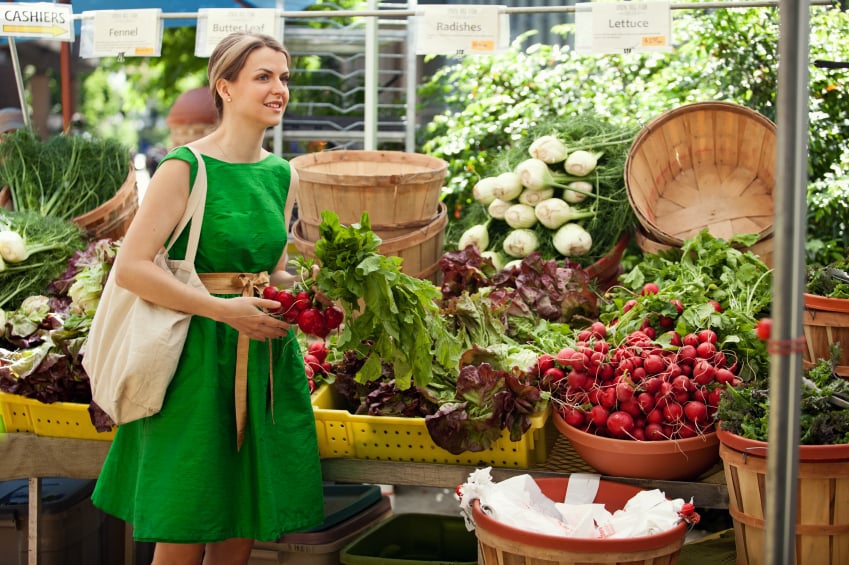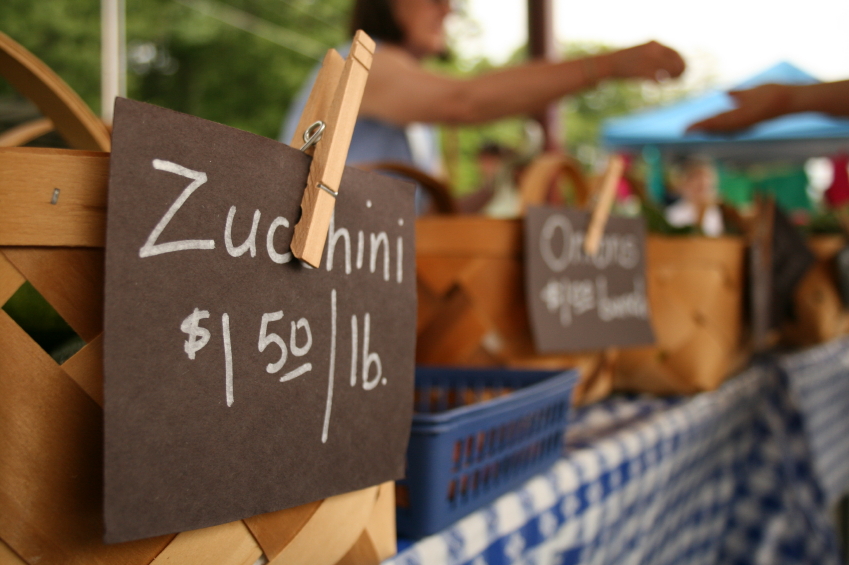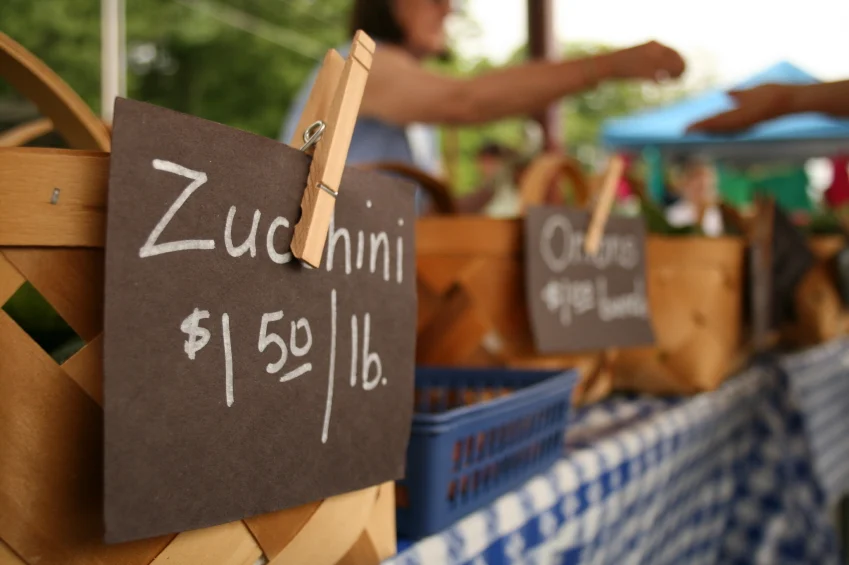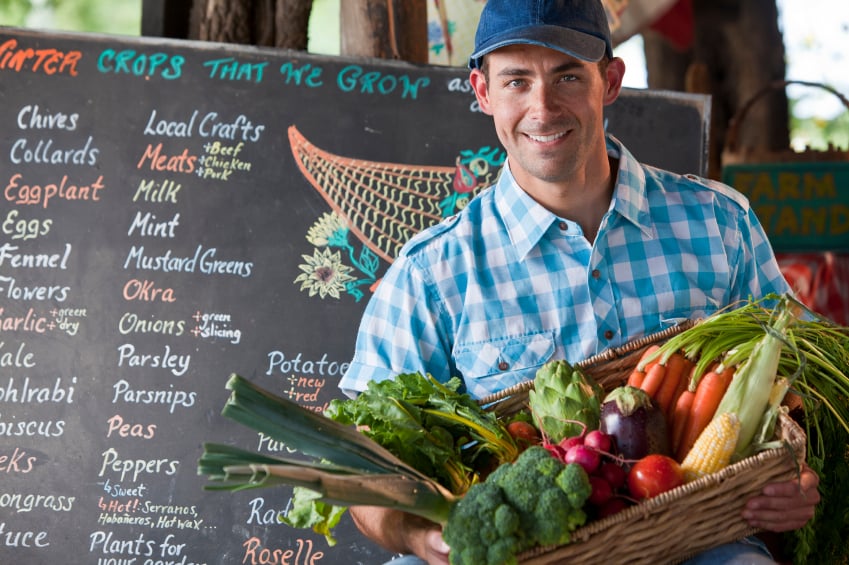Farmers markets are gaining popularity throughout the U.S. and offer consumers a way to purchase foods grown by local farmers or prepared by local artisans. Often, these foods are organic or natural, and you can find seasonal produce as well as meats, seafood, eggs, and flowers. You even have the opportunity to talk directly to the farmers, ask questions, and sometimes even enjoy a hot donut while listening to live music. The markets vary in size and frequency depending on location, but they all offer a chance for you to get a little bit closer to your food in a fun, exciting way. Here are our tips for making the most of your trip to the farmers market. And, if you have never shopped the farmers market, we hope these will help you feel prepared and excited for a new and unintimidating way of shopping.
Find your local farmers markets by clicking here.
1. Know what’s in season
It’s important to know what’s in season where you live so you can have confidence what you are buying is local and fresh. You’ll find local, in-season produce tastes much better than their supermarket counterparts, and during peak season, you will see prices drop at the farmers market as more producers have similar products. Look for producer-only markets to ensure the farm selling the product is the same farm that grew it, or just ask the seller if they grew, raised or made it and where. Use this Peak-Season Map from Epicurious to find out what’s in season near you.
2. Take your time
It’s best not to rush at the farmers market. Think of your trip as an experience, not a chore. You can bring the kids (many markets have activities for children and have food vendors or entertainment, plus they can learn about food), or just grab a coffee and a freshly made donut and wander for a while before you shop. We recommend you do a lap of the market before purchasing. You will see many of the same offerings at different stands, so if you are looking for a good deal, it helps to peruse and comparison shop before you purchase.
3. Go early (and often)
You’ll find the best selection when the market first opens. The produce won’t be picked over yet, your favorite farm-fresh eggs will still be in stock. You’ll be better able to converse with the farmers without feeling rushed. If you go to the market regularly, you will learn what’s in season and get excited when you see the first local tomatoes hitting the stands. You’ll develop relationships with your food producers and feel even more comfortable asking questions.

4. Bring your own bags
One of the great advantages to shopping at the farmers market is you are supporting the environment through reduced emissions used to transport food. By meeting your farmer at the market directly, you greatly reduce waste. This is especially true if you bring your own reusable shopping bags, a large canvas tote, or a market basket. Many vendors don’t offer plastic bags and the ones that do are usually not very sturdy. You can also recycle your egg cartons or berry crates; just bring them back to the market the next week. Your farmers will be happy to reuse these supplies and grateful for your help.
5. Bring cash
Most farmers market vendors don’t accept credit cards, so bring cash and bring it in small bills like 1s and 5s, if possible. Occasionally, food vendors or suppliers of more expensive products like housewares, wines, meats, or seafood will take cards, but you can play it safe by bringing cash. Also check with the market coordinator or the market website to see if your local market participates in low-income subsidy programs, such as WIC and SNAP.
6. Know your needs
Sometimes going to the farmers market is almost too much fun! It’s very easy to get caught up in all the beautiful colors and varieties of fruits and vegetables. To reduce the risk of extra food going bad and needing to be thrown out, think ahead about how many nights you plan to cook that week or how many meals you need to prepare. By thinking this through, you’ll have a better idea of how much you should take away from the market. Remember, if there is something you love, you can always buy in bulk (savings!) and preserve the food through one of the many preservation methods, such as canning, pickling or dehydrating.
7. Ask a lot of questions
The farmers at the markets are an underutilized resource for information. “Ask as many questions as you can. Ask about how things are grown, ask if they are certified organic, and if they aren’t, ask why not. A lot of certifications are expensive, so farmers don’t get certified even though they may follow organic or natural practices,” says GrowRVA owner Karen Atkinson. Feel comfortable asking about how weeds and insects are controlled or where the food is grown. If purchasing meat, you can ask about what the animals are fed and how they are kept. Farmers are often very proud of their work and are happy to answer your questions. Additionally, ask how they like to prepare the foods they sell. Who better to ask for advice than the person who eats, sleeps, and breathes their product!
8. Store foods properly
If you plan on running some other errands after the market or you want to drop off your food and go back to enjoy the festivities, consider bringing a cooler and ice packs along. This will ensure your frozen meats don’t thaw and your herbs don’t wilt. If you aren’t sure how to store your goods, ask the farmers when you buy them. They will be able to give you some tips.
9. Buy ugly stuff
These days, we are so used to how fruits and vegetables look under the bright lights of the grocery store. They are often shiny, plastic-wrapped, or pre-chopped, and there is not a speck of dirt to be found. It is different at the farmers market since many of these foods were picked, pulled, or cut that same morning. Some foods may have had a rudimentary washing, but many will still have some natural leftover dirt from Mother Nature. Weird looking carrots or apples will often taste the best, so don’t pass over an item for minor visual imperfections. The more you shop, the more comfortable you will become with what food looks like directly from the source.
10. Have fun and be flexible
This is the most important tip of all. Farmers markets are all about finding what’s in season, so if you were planning on buying squash and the crop just isn’t in yet, you’ll be out of luck. Keep your shopping plan flexible and make substitutions as necessary. Also, have fun with your purchases. Try new things you’ve never had before and you may just end up with a new favorite food!





Comments